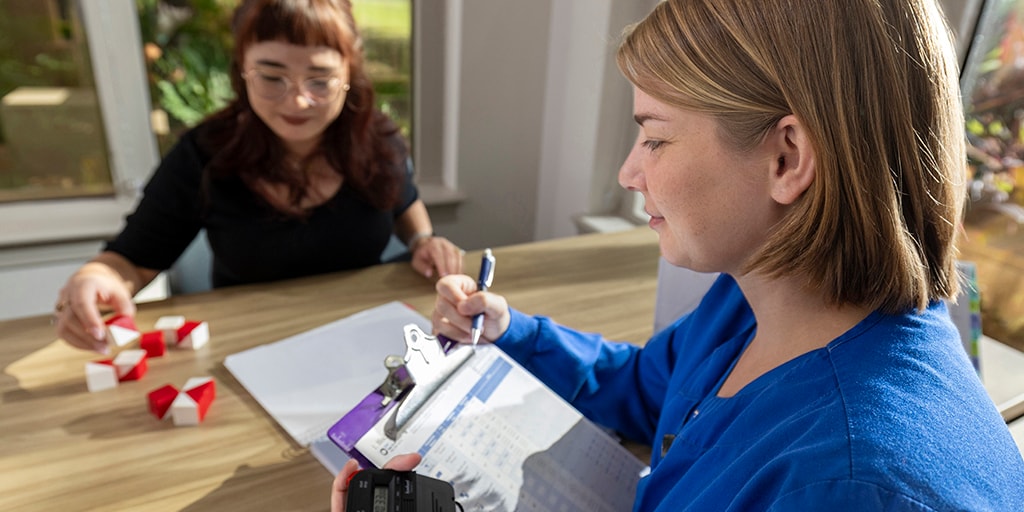/prod01/channel_2/media/mccms/content-assets/academics/residencies-and-fellowships/clinical-neuropsychology-fellowship-florida/curriculum/clin-neuro-fl-hallway-1024X512-Photo2.jpg)
Curriculum
Throughout the course of the two-year Clinical Neuropsychology Fellowship, your postdoctoral training experience is divided into 75 percent clinical service and didactics and 25 percent research.
Clinical service activities are primarily related to traditional outpatient neuropsychological assessment but will also include innovative programmatic interventions as well as surgical monitoring, localization, and rehabilitation techniques as possible. You will spend time in three primary clinical rotations during the 24-month training experience:
- Classic Primary Neurodegenerative Disease and Clinical Prodromes
- Neurosurgical Populations (Epilepsy/Neuro-Oncology/Cerebrovascular)
- Complex Medical Neuropsychology/ Genetic Conditions
Each clinical training rotation will have specialized didactics to support the work, including pathology, clinical conferences, multi-specialty surgical planning conferences, and clinical research opportunities/discussion.
You are supervised directly by faculty on each clinical case. For outpatient neuropsychological assessments, you meet with the attending supervisor after each case to address the referral questions and patient-tailored recommendations.
Clinical training

This program has required primary clinical rotations in primary neurodegenerative diseases, neurosurgical applications, and complex medical neuropsychology.
Major rotations involve outpatient evaluations (five cases per week, except during neurosurgical rotation, HABIT®program, or elective shadowing time). All evaluations include psychometrist support. Cross-cultural and bilingual (Spanish-language) neuropsychological evaluations are unique training experiences embedded within these primary rotations.
The neurosurgical rotation includes outpatient neuropsychological evaluation, use of a tablet-based brain mapping tool (NeuroMapper), stereotactic EEG opportunities, and acute postsurgical follow-up with neurosurgical patients.
During the primary neurodegenerative disease rotation, fellows see patients across the normal aging-MCI-dementia spectrum under the supervision of clinical investigators of the Mayo Clinic NIA-funded Alzheimer’s Disease Research Center. They also intervene with patient-carer dyads of Mild Cognitive Impairment, by delivering components of the Healthy Action to Benefit Independence and Thinking (HABIT®) program and following up with HABIT® participants and monitoring intervention outcomes.
As part of the complex medical neuropsychology rotation, fellows will see patients with functional neurological disorders in addition to people with other complex medical conditions. Unique to functional disorders, fellows will learn how to provide evaluation, psychoeducation, and intervention to try to improve functional symptoms.
Fellows are allowed up to four elective shadowing rotations during their training cycle. During this time, outpatient evaluation caseload is reduced to four cases per week, allowing the fellow one day per week to shadow a specialty provider in a related clinical practice area. Fellows have elected to shadow providers in behavioral neurology, movement disorder, epilepsy, neuroradiology, neuro-autoimmune neurology, transplant medicine, psychiatry, acute neurology, and sleep medicine.
Clinical neuropsychology fellows may elect to spend one month training with the neuropsychology faculty at Mayo Clinic's campus in Rochester, Minnesota, or campuses in Phoenix and Scottsdale, Arizona. This off-site rotation is available to gain site-specific training experiences reflective of their professional goals.
Didactic training
As a fellow, you can participate in case discussions and journal club in clinical neuropsychology and professional development, as well as a biweekly Mayo Clinic Multi-Site Neuropsychology Conference. There are weekly grand rounds in neurology, and specialty rounds in neurology, neurosurgery, and acute neurology.
You can also attend interdisciplinary team meetings for neurosurgery, epilepsy, behavioral neurology, ALS, and transplant medicine.
Didactics include courses in:
- Neuroanatomy
- Neuropathology
- Neurohistopathology
- Neuroscience
- Behavioral neurology
- Clinical neurology
- Neuroradiology
Research training
Fellows are required to dedicate some learning time to research. Fellows can seek mentorship from any faculty member and can develop a research question utilizing an existing data set or pose a unique question. Grant writing workshops and mentoring are offered to fellows with interest.
Prior fellows have pursued research opportunities in aging, primary neurodegenerative disease, epilepsy, neuro-oncology, neuropsychological intervention, motor neuron disease, and cross-cultural neuropsychological assessment and interventions.
Fellows are required to develop and submit at least one abstract for presentation of their research at a conference. Fellows are strongly encouraged to submit a research manuscript for peer-reviewed publication based on their research. Prior fellows have successfully published multiple peer-reviewed articles, and have presented research at regional, national, and international conferences. Mayo Clinic covers presentation travel.
Trip policy
Fellows are eligible for one paid education trip (without required presentation) during their training program for attendance at a recognized society meeting, elective course, or workshop with APA continuing education credit.
Fellows are also eligible for a maximum of 10 presentation weekdays per academic year, limited to three consecutive days per trip. Trips for the presentation of work/research done at Mayo are in addition to an attendance trip.
Professional development
Fellows are required to prepare for licensure by studying for and taking the EPPP. Study materials are purchased for fellows. Fellows are required to sit for the State of Florida Department of Health Psychology Laws and Rules Examination before completing their training cycle and will be license-eligible in most states upon completion of the program.
Benefits
Fellows in this program enjoy the following benefits:
- Competitive salary and benefits with comprehensive health insurance
- Administrative support services
- Vacation (15 working days per year)
- EPPP study materials; Florida Licensure fee
- ABCN early entry fee coverage
See the Stipend and Benefits page for more information.
Learner environment
Mayo Clinic is recognized as the nation’s No. 1 hospital and nationally ranked in 15 adult specialties and 7 pediatric specialties.
Jacksonville is an affordable city with diverse neighborhoods and offerings, a year-round outdoor activity climate, and miles of beaches along the Atlantic Ocean coastline. The Jacksonville International Airport is flyer-friendly and offers direct flights to major cities on both coasts. Day trips are easy to Orlando, Savannah, Georgia, and Charleston, South Carolina.